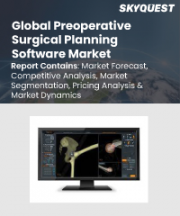
|
시장보고서
상품코드
1898609
수술전 외과 계획 소프트웨어 시장 규모, 점유율, 성장 분석 : 유형별, 용도별, 최종사용자별, 지역별 - 업계 예측(2026-2033년)Preoperative Surgical Planning Software Market Size, Share, and Growth Analysis, By Type (Off-Premise, On-Premise), By Application (Orthopedic Surgery, General Orthopedic Surgery), By End User, By Region - Industry Forecast 2026-2033 |
||||||
수술전 수술 계획 소프트웨어 시장 규모는 2024년에 12억 2,000만 달러로 평가되며, 2025년 13억 5,000만 달러에서 2033년까지 30억 5,000만 달러로 성장할 전망입니다. 예측 기간(2026-2033년)의 CAGR은 10.7%로 예측됩니다.
수술 전 수술 계획 소프트웨어 시장은 의료 전문가가 철저한 수술 절차를 계획하는 데 사용하는 기술과 관련된 시장입니다. 이러한 솔루션은 환자의 해부학적 구조를 상세하게 시각화하여 외과 의사가 효과적으로 개입 전략을 수립하고 합병증을 최소화하며 수술 결과를 개선할 수 있도록 돕습니다. 이 시장은 의료 영상 기술의 혁신, 최소 침습 수술 기술에 대한 선호도 증가, 수술의 정확성에 대한 중요성 증가에 의해 주도되고 있습니다. 주요 업계 기업은 다양한 의료 전문 분야를 위한 맞춤형 첨단 소프트웨어 개발에 주력하고 있습니다. 의료기술이 계속 발전함에 따라 이 시장은 상당한 성장이 예상되며, 전 세계 환자 치료와 업무 효율성 향상에 기여하고, 소프트웨어를 현대 외과 진료의 중요한 요소로 자리매김하고 있습니다.
수술 전 수술 계획 소프트웨어 시장 성장 촉진요인
수술 전 수술 계획 소프트웨어 시장은 MRI, CT 스캔, 3D 이미징을 포함한 의료 영상 기술의 발전에 크게 영향을 받고 있습니다. 이러한 혁신을 통해 수술 전 계획에 사용할 수 있는 정확도와 세부 사항이 크게 향상되어 복잡한 해부학적 구조를 보다 종합적으로 이해할 수 있게 되었습니다. 이러한 고급 이미지를 효과적으로 통합하고 시각화하는 소프트웨어 솔루션은 외과 의사가 보다 현명한 판단을 내릴 수 있도록 도와주며, 궁극적으로 수술 결과를 개선할 수 있도록 돕습니다. 수술 전에 복잡한 세부 사항을 확인할 수 있는 능력은 수술 준비를 강화할 뿐만 아니라 전체 수술 절차의 효율성과 효과를 향상시켜 현대 수술 실습에 필수적인 툴이 되고 있습니다.
수술 전 수술 계획 소프트웨어 시장 성장 억제요인
수술 전 수술 계획 소프트웨어 시장은 비용과 관련된 심각한 문제에 직면해 있습니다. 이러한 고급 소프트웨어의 개발, 도입 및 유지보수에는 많은 자금이 필요할 수 있으며, 병원과 의료기관은 이러한 투자에 신중을 기할 수밖에 없습니다. 이러한 망설임은 예산의 제약이 의사결정에 중요한 역할을 하는 자원 제약 환경에서 특히 두드러집니다. 그 결과, 종합적인 수술 계획 솔루션 도입에 따른 높은 비용으로 인해 많은 잠재적 사용자가 보다 경제적으로 실현 가능한 대안을 선택할 수 있으며, 이는 시장 성장을 저해하는 요인이 될 수 있습니다.
수술 전 수술 계획 소프트웨어 시장 동향
수술 전 수술 계획 소프트웨어 시장은 3D 이미징, 가상현실(VR), 증강현실(AR)을 포함한 첨단 이미징 및 시각화 기술의 통합에 의해 점점 더 주도되고 있습니다. 이러한 혁신 기술은 수술 계획의 정확성과 정밀도를 높이고, 외과 의사가 복잡한 해부학적 구조를 상세하고 몰입감 있는 환경에서 시각화할 수 있게 해줍니다. 이러한 추세는 수술 전 인사이트를 향상시키고 환자별 해부학적 구조에 대한 깊은 이해를 통해 수술 결과를 개선할 수 있는 툴에 대한 수요가 증가하고 있음을 반영합니다. 이러한 첨단 기술들이 발전하고 더 쉽게 사용할 수 있게 됨에 따라 수술 계획 워크플로우 내에서의 채택이 확대되고, 수술 절차 분야에 더 많은 변화를 가져올 것으로 예측됩니다.
자주 묻는 질문
목차
서론
- 조사의 목적
- 조사 범위
- 정의
조사 방법
- 정보 조달
- 2차와 1차 데이터 방법
- 시장 규모 예측
- 시장 전제조건과 제한
개요
- 세계 시장 전망
- 공급과 수요 동향 분석
- 부문별 기회 분석
시장 역학과 전망
- 시장 규모
- 시장 역학
- 촉진요인과 기회
- 억제요인과 과제
- Porter의 산업 분석
주요 시장 인사이트
- 주요 성공 요인
- 경쟁의 정도
- 주요 투자 기회
- 시장 에코시스템
- 시장의 매력 지수(2025년)
- PESTEL 분석
- 거시경제 지표
- 밸류체인 분석
- 가격 분석
- 사례 연구
- 기술 분석
세계의 수술전 외과 계획 소프트웨어 시장 규모 : 유형별 & CAGR(2026-2033)
- 오프 프레미스
- 온프레미스
세계의 수술전 외과 계획 소프트웨어 시장 규모 : 용도별 & CAGR(2026-2033)
- 정형외과수술
- 일반 정형외과수술
- 변형 교정
- 골절 관리
- 관절 재건
- 신경외과
- 치과·교정 치과 분야
- 기타
세계의 수술전 외과 계획 소프트웨어 시장 규모 : 최종사용자별 & CAGR(2026-2033)
- 병원
- 정형외과 클리닉
- 재활 센터
세계의 수술전 외과 계획 소프트웨어 시장 규모 & CAGR(2026-2033)
- 북미
- 미국
- 캐나다
- 유럽
- 독일
- 스페인
- 프랑스
- 영국
- 이탈리아
- 기타 유럽 지역
- 아시아태평양
- 중국
- 인도
- 일본
- 한국
- 기타 아시아태평양
- 라틴아메리카
- 브라질
- 기타 라틴아메리카 지역
- 중동 및 아프리카
- GCC 국가
- 남아프리카공화국
- 기타 중동 및 아프리카
경쟁 정보
- 상위 5사의 비교
- 주요 기업의 시장 포지셔닝(2025년)
- 주요 시장 기업이 채택한 전략
- 최근 시장 동향
- 기업의 시장 점유율 분석(2025년)
- 주요 기업의 기업 개요
- 기업의 상세
- 제품 포트폴리오 분석
- 기업의 부문별 점유율 분석
- 매출의 전년대비 비교(2023-2025년)
주요 기업 개요
- Materialise NV(Belgium)
- Stryker Corporation(United States)
- Medtronic Plc(Ireland)
- Siemens Healthineers AG(Germany)
- Brainlab AG(Germany)
- Planmed Oy(Finland)
- Koninklijke Philips N.V.(Netherlands)
- Curexo Technology Corporation(South Korea)
- 3D Systems Corporation(United States)
- EchoPixel, Inc.(United States)
- ClaroNav Inc.(Canada)
- Mimics Innovation Suite(Materialise NV)(Belgium)
- Synaptive Medical Inc.(Canada)
- Hologic, Inc.(United States)
- Karl Storz GmbH & Co. KG(Germany)
- Zimmer Biomet Holdings, Inc.(United States)
- InnerOptic Technology, Inc.(United States)
결론과 제안
KSA 26.01.15Preoperative Surgical Planning Software Market size was valued at USD 1.22 Billion in 2024 and is poised to grow from USD 1.35 Billion in 2025 to USD 3.05 Billion by 2033, growing at a CAGR of 10.7% during the forecast period (2026-2033).
The preoperative surgical planning software market pertains to technology utilized by healthcare professionals for thorough surgical procedure planning. These solutions offer detailed visualization of patient anatomy, empowering surgeons to effectively strategize interventions, minimize complications, and improve operational outcomes. The market is fueled by innovations in medical imaging, an increasing preference for minimally invasive surgical techniques, and a growing emphasis on surgical precision. Major industry players are focused on creating cutting-edge software tailored for diverse medical specialties. As healthcare technology continues to evolve, this market is poised for substantial growth, which will enhance patient care and operational efficiency worldwide, positioning software as a crucial component in modern surgical practices.
Top-down and bottom-up approaches were used to estimate and validate the size of the Preoperative Surgical Planning Software market and to estimate the size of various other dependent submarkets. The research methodology used to estimate the market size includes the following details: The key players in the market were identified through secondary research, and their market shares in the respective regions were determined through primary and secondary research. This entire procedure includes the study of the annual and financial reports of the top market players and extensive interviews for key insights from industry leaders such as CEOs, VPs, directors, and marketing executives. All percentage shares split, and breakdowns were determined using secondary sources and verified through Primary sources. All possible parameters that affect the markets covered in this research study have been accounted for, viewed in extensive detail, verified through primary research, and analyzed to get the final quantitative and qualitative data.
Preoperative Surgical Planning Software Market Segments Analysis
Global Preoperative Surgical Planning Software Market is segmented by Type, Application, End User and region. Based on Type, the market is segmented into Off-Premise and On-Premise. Based on Application, the market is segmented into Orthopedic Surgery, General Orthopedic Surgery, Deformity Correction, Fracture Management, Joint Reconstruction, Neurosurgery, Dental & Orthodontics Application and Others. Based on End User, the market is segmented into Hospitals, Orthopedic Clinics and Rehabilitation Centers. Based on region, the market is segmented into North America, Europe, Asia Pacific, Latin America and Middle East & Africa.
Driver of the Preoperative Surgical Planning Software Market
The Preoperative Surgical Planning Software market is significantly influenced by advancements in medical imaging technologies, including MRI, CT scans, and 3D imaging. These innovations have greatly enhanced the precision and detail available for preoperative planning, allowing for a more comprehensive understanding of complex anatomical structures. Software solutions that effectively integrate and visualize these advanced images enable surgeons to make more informed decisions, ultimately leading to improved surgical outcomes. The ability to see intricate details prior to surgery not only enhances preparation but also boosts the overall efficiency and effectiveness of surgical procedures, making these tools essential in modern surgical practice.
Restraints in the Preoperative Surgical Planning Software Market
The Preoperative Surgical Planning Software market faces significant challenges related to cost. The development, implementation, and maintenance of such advanced software can require substantial financial resources, causing hospitals and healthcare institutions to be cautious about committing to these investments. This hesitation is especially pronounced in resource-constrained environments where budget limitations play a critical role in decision-making. Consequently, the high costs associated with adopting comprehensive surgical planning solutions can hinder the market's growth, as many potential users may opt to forego these technologies in favor of more economically viable alternatives.
Market Trends of the Preoperative Surgical Planning Software Market
The preoperative surgical planning software market is increasingly driven by the integration of advanced imaging and visualization technologies, including 3D imaging, virtual reality (VR), and augmented reality (AR). These innovations enhance the precision and accuracy of surgical planning, permitting surgeons to visualize complex anatomical structures in a detailed and immersive environment. This trend reflects a growing demand for tools that improve surgical outcomes through better preoperative insights and a deeper understanding of patient-specific anatomy. As these advanced technologies evolve and become more accessible, their adoption within surgical planning workflows is expected to expand, further revolutionizing the landscape of surgical procedures.
Table of Contents
Introduction
- Objectives of the Study
- Scope of the Report
- Definitions
Research Methodology
- Information Procurement
- Secondary & Primary Data Methods
- Market Size Estimation
- Market Assumptions & Limitations
Executive Summary
- Global Market Outlook
- Supply & Demand Trend Analysis
- Segmental Opportunity Analysis
Market Dynamics & Outlook
- Market Overview
- Market Size
- Market Dynamics
- Drivers & Opportunities
- Restraints & Challenges
- Porters Analysis
- Competitive rivalry
- Threat of substitute
- Bargaining power of buyers
- Threat of new entrants
- Bargaining power of suppliers
Key Market Insights
- Key Success Factors
- Degree of Competition
- Top Investment Pockets
- Market Ecosystem
- Market Attractiveness Index, 2025
- PESTEL Analysis
- Macro-Economic Indicators
- Value Chain Analysis
- Pricing Analysis
- Case Studies
- Technology Analysis
Global Preoperative Surgical Planning Software Market Size by Type & CAGR (2026-2033)
- Market Overview
- Off-Premise
- On-Premise
Global Preoperative Surgical Planning Software Market Size by Application & CAGR (2026-2033)
- Market Overview
- Orthopedic Surgery
- General Orthopedic Surgery
- Deformity Correction
- Fracture Management
- Joint Reconstruction
- Neurosurgery
- Dental & Orthodontics Application
- Others
Global Preoperative Surgical Planning Software Market Size by End User & CAGR (2026-2033)
- Market Overview
- Hospitals
- Orthopedic Clinics
- Rehabilitation Centers
Global Preoperative Surgical Planning Software Market Size & CAGR (2026-2033)
- North America (Type, Application, End User)
- US
- Canada
- Europe (Type, Application, End User)
- Germany
- Spain
- France
- UK
- Italy
- Rest of Europe
- Asia Pacific (Type, Application, End User)
- China
- India
- Japan
- South Korea
- Rest of Asia-Pacific
- Latin America (Type, Application, End User)
- Brazil
- Rest of Latin America
- Middle East & Africa (Type, Application, End User)
- GCC Countries
- South Africa
- Rest of Middle East & Africa
Competitive Intelligence
- Top 5 Player Comparison
- Market Positioning of Key Players, 2025
- Strategies Adopted by Key Market Players
- Recent Developments in the Market
- Company Market Share Analysis, 2025
- Company Profiles of All Key Players
- Company Details
- Product Portfolio Analysis
- Company's Segmental Share Analysis
- Revenue Y-O-Y Comparison (2023-2025)
Key Company Profiles
- Materialise NV (Belgium)
- Company Overview
- Business Segment Overview
- Financial Updates
- Key Developments
- Stryker Corporation (United States)
- Company Overview
- Business Segment Overview
- Financial Updates
- Key Developments
- Medtronic Plc (Ireland)
- Company Overview
- Business Segment Overview
- Financial Updates
- Key Developments
- Siemens Healthineers AG (Germany)
- Company Overview
- Business Segment Overview
- Financial Updates
- Key Developments
- Brainlab AG (Germany)
- Company Overview
- Business Segment Overview
- Financial Updates
- Key Developments
- Planmed Oy (Finland)
- Company Overview
- Business Segment Overview
- Financial Updates
- Key Developments
- Koninklijke Philips N.V. (Netherlands)
- Company Overview
- Business Segment Overview
- Financial Updates
- Key Developments
- Curexo Technology Corporation (South Korea)
- Company Overview
- Business Segment Overview
- Financial Updates
- Key Developments
- 3D Systems Corporation (United States)
- Company Overview
- Business Segment Overview
- Financial Updates
- Key Developments
- EchoPixel, Inc. (United States)
- Company Overview
- Business Segment Overview
- Financial Updates
- Key Developments
- ClaroNav Inc. (Canada)
- Company Overview
- Business Segment Overview
- Financial Updates
- Key Developments
- Mimics Innovation Suite (Materialise NV) (Belgium)
- Company Overview
- Business Segment Overview
- Financial Updates
- Key Developments
- Synaptive Medical Inc. (Canada)
- Company Overview
- Business Segment Overview
- Financial Updates
- Key Developments
- Hologic, Inc. (United States)
- Company Overview
- Business Segment Overview
- Financial Updates
- Key Developments
- Karl Storz GmbH & Co. KG (Germany)
- Company Overview
- Business Segment Overview
- Financial Updates
- Key Developments
- Zimmer Biomet Holdings, Inc. (United States)
- Company Overview
- Business Segment Overview
- Financial Updates
- Key Developments
- InnerOptic Technology, Inc. (United States)
- Company Overview
- Business Segment Overview
- Financial Updates
- Key Developments



















